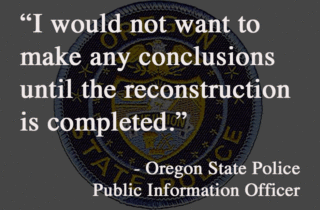Scottie Graser died after a collision with a truck driver while he was riding on Highway 30 on January 13th.
Most people think it was his fault.
The truth is, we don’t yet know exactly what happened. So why do most people blame Graser? Because the Oregon State Police said so.
The official crash statement released by the OSP a mere six hours after the collision read, “Preliminary investigation reveals… Graser… entered the eastbound right lane and a collision occurred.”
As usual, the statement — issued long before the completion of the investigation — was used as the nearly sole basis of many local media stories. It’s one of the big problems in the public perception of these crashes*: Local media copy/pastes police statements into their “stories”. This gives even more authority to the statements because many people think they’re reading reporting when they’re actually reading a police press release. (*For more on the issue of media bias in crash reporting, see this Streetsblog post from January, Six ways the media is still blaming the victim and this new research out of Rutgers and Texas A & M.)
Police press releases are not unbiased accounts. The people who write them are not present when the crash happens and they very likely have a strong bias in favor of the driver’s perspective. These statements almost never interview the vulnerable road user (who is usually either deceased or unable to remember/speak) and when they include information from witnesses, the witnesses are usually also behind the wheel of a car and are therefore are likely to sympathize with that point of view. Therefore, when the media simply regurgitates police press releases without any context, note of caution, or original reporting, they are nothing more than a mouthpiece for police organizations. Even worse, they can perpetuate inaccuracies that misinform the public.
In the case of Scottie Graser, I followed up with the OSP Public Information Officer to learn more. I asked about the assertion that Graser veered out of his lane prior to being struck. “What leads you to believe this?” I asked. The PIO said witness statements from the driver of the truck that hit Graser and another driver that saw the crash led them to that assumption.
So it wasn’t the OSP that believed Graser left his lane of travel and got hit, it was two witnesses — neither of whom are likely to sympathize with a man bicycling on a highway.
To clarify, the PIO added, “I would not want to make any conclusions until the reconstruction is completed.”
Unfortunately, the PIO’s statement did exactly that. It created a narrative that Graser caused his own death.
The real truth is that we don’t know how exactly this collision occurred. The OSP is still working to complete the investigation.
Whether it was carelessness, bias, or some combination of the two, police owe it to crash victims and the public be more sensitive with these statements. They are powerful messages that set the tone for how we digest crashes — and ultimately — what we do to prevent them.
— Jonathan Maus: (503) 706-8804, @jonathan_maus on Twitter and jonathan@bikeportland.org
Never miss a story. Sign-up for the daily BP Headlines email.
BikePortland needs your support.
The post Opinion: Why words matter in police statements about traffic crashes appeared first on BikePortland.org.
from Latest headlines from BikePortland http://bit.ly/2G9aASU



No comments:
Post a Comment